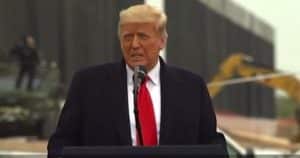Michael Cohen Appeals to Supreme Court Over Allegedly Retaliatory Imprisonment
In a significant legal challenge, Michael Cohen, former lawyer for President Donald Trump, has taken his case to the Supreme Court, alleging unconstitutional retaliation by the former administration.
Cohen claims that his re-imprisonment was a direct result of his plan to criticize Trump in an upcoming book, and he is now urging the Supreme Court to consider the constitutional implications, as Fox News reports.
On Wednesday, Cohen filed a petition with the highest court in the nation, responding to previous court decisions that have dismissed his concerns.
This move marks a pivotal point in his long-standing battle against alleged abuses of power by the Trump administration.
Chronology of Cohen’s Legal Struggles
In July 2020, following his announcement to publish a book critical of Trump, Cohen was abruptly returned to jail from home confinement, a decision he claims was made to punish him for his dissent. This claim was later supported by U.S. Federal Court Judge Alvin K. Hellerstein, who ruled that the re-imprisonment was indeed an act of retaliation violating Cohen’s First Amendment rights.
Judge Hellerstein’s decision underscored the alleged misuse of power, stating, "The purpose of transferring Mr. Cohen from furlough and home confinement to jail is retaliatory." However, despite this ruling, subsequent appeals have been less favorable to Cohen.
Legal Opinions and Trump’s Defense
The 2nd Circuit U.S. Court of Appeals ruled that Cohen’s ultimate release back to home confinement was a sufficient remedy, dismissing the need for further legal action. Meanwhile, Trump’s legal team continues to denounce Cohen’s claims as baseless. Trump lawyer Alina Habba argued, "Michael Cohen’s suit against the president was doomed from its very inception," citing recent Supreme Court decisions that limit the scope of so-called Bivens actions.
Trump himself has hinted at the prosecutorial powers of his office, stating, "I would have every right to go after them," though he claimed he would not pursue such actions. This statement adds a layer of complexity to the ongoing narrative of power and retaliation that Cohen’s case presents.
Broader Implications for Constitutional Rights
Cohen’s attorney, Jon-Michael Dougherty, emphasizes the broader constitutional stakes at play, stating, "This case presents an important and unprecedented question -- what remedy will this country provide a citizen who was incarcerated because of their criticism of government officials."
The petition to the Supreme Court starkly notes, "Presidents are not kings. This case represents the principle that presidents and their subordinates cannot lock away critics of the executive without consequence."
Despite Trump’s administration's dismissal of Cohen as a "disgruntled disgrace," Cohen remains steadfast. He was a key witness in a trial that saw Trump convicted of multiple felonies, bolstering his credibility in the eyes of his supporters.
The Fight for Free Speech and Legal Recourse
Cohen's statements have been poignant and critical of the Trump administration’s tactics. "To have a President weaponize the DOJ...is how autocracies are created," he stated, expressing deep concern over the erosion of democratic norms.
Moreover, Cohen warns, "Be warned...Donald will do it again and again if given the chance!" This stark warning underlines the recurring fear of political retribution that frames his Supreme Court appeal.
In conclusion, Michael Cohen’s journey through the legal system highlights a contentious battle over free speech and the alleged misuse of presidential power. He says his Supreme Court petition not only seeks personal redress but also aims to protect the fundamental rights outlined in the Constitution, asserting that no president should have the authority to use the justice system as a tool for silencing criticism.




